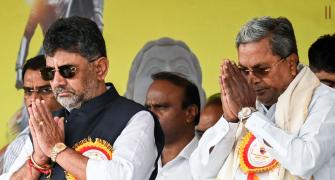One of the biggest stories at the World Economic Forum played to a sparse but attentive crowd on Saturday: business' next generation.
Leaders of emerging multinationals from Russia (VimpelCom), India (ArcelorMittal and ICICI Bank), Dubai (Dubai Holding Co), Mexico (Grupo Televisa) and Indonesia (Lippo Group) showed they have much in common that pose a disruptive competitive threat to existing Western companies--new business models, low costs and high margins, openness to the best and latest technologies and ideas, an innate cultural diversity and the hunger of the young to succeed.
In an interview, one veteran Indian tech executive talked about a challenge that is familiar to this group: managing growth. Even if US and EU executives talked of other problems this week, plenty of other business leaders--labeled New Champions here at Davos--share a common set of challenges centered on issues of scale and the hunt for talent.
S. Gopalakrishnan, co-founder and chief executive of Bangalore-based Infosys Technologies, has reported 25% year-on-year growth. On the day of the forum session "Adapting To New Champions," he sat for an interview with Forbes.com and said that his company typically hires 8,000 people a quarter, mostly in India.
Gopalakrishnan emphasized that he won't have a forecast for the next fiscal year until April, "but we are recruiting in the U.S., we are recruiting in Europe, in China. Globally we are recruiting." He talked about growing Infosys operations in the Philippines, Mexico and Eastern Europe.
Does that mean that Infosys is sending Indian tech jobs to Mexico? "We are recruiting everywhere--the bulk will be in India," he said.
Has he, too, noticed what Stephen Colbert might call the cry-in-my-caviar mood of the conference? Gopalakrishnan is far too polite, and comes across as far too reserved, to use such language. But his feelings at this Davos meeting, his "third or fourth," are clear: "What I found here, on the macro level ... everybody talks about the slowdown, but on the micro level, their business, everybody is doing well."
He spoke admiringly of Bill Gates' speech Thursday on social responsibility. The No. 1 social cause for Infosys is education, including assistance to top engineering programs, a clear benefit for a tech company that hires so many engineers. Gopalakrishnan also spoke of the importance of helping the large numbers of Indians who cannot read or write.
A short while later, at the New Champions session, that sense of social responsibility united a geographically diverse group: a sense of what Mohammad Al Gergawi, chairman and chief executive of Dubai Holding, called "business with a cause." In his case it is creating new jobs in the Arab and Islamic world, 80 million of which, he says, are needed in the next 10 years to absorb a young and growing population coming of working age.
Speakers talked about a conviction that a company must not only make money but have a vision its employees can embrace that they are also doing social good, even if it is just enlightened self interest like efforts by Infosys and ICICI to support universities that expand the pool of potential future recruits.
In the interview, Gopalakrishnan said there are now 1.3 million information technology professionals in India, a number growing at about 25 per cent a year. At that rate, "sometime in the next three to five years, India will surpass the U.S. in the number of IT professionals," he said.
Short term, his biggest worry: "Are you on top of things? Are you hearing things? Are you able to assess impact? Is there something we are missing?"
After that? "If you take that out, it is all about managing growth."








